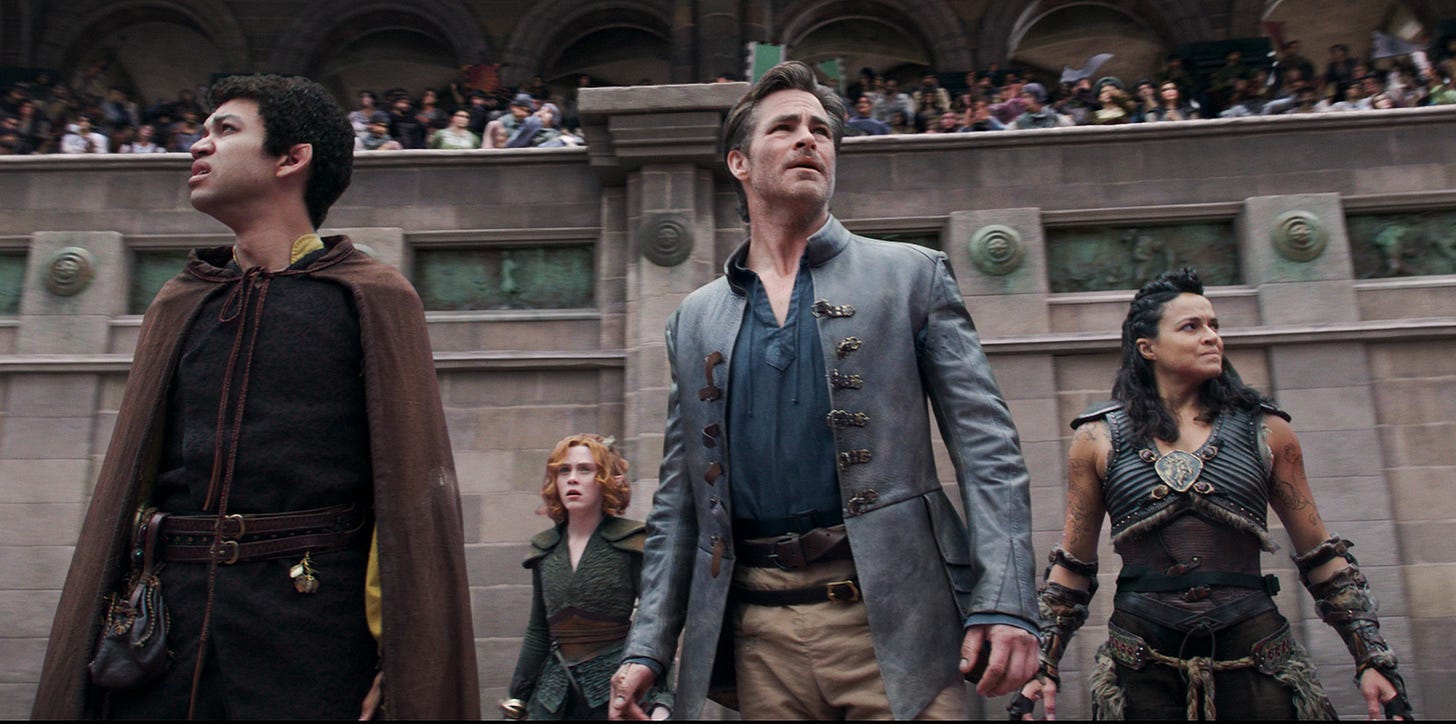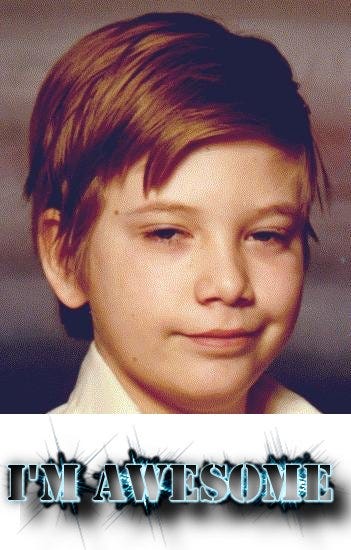Dungeons & Dragons: Honor Among Thieves: Allow Me to Introduce Myself
A lightweight comedy set in a RPG world absolutely nails the fine art of quickly establishing characters.

One of the many, many (many) aspects of telling a story that bedevil writers is character work1. Characters that are thrillingly alive in your head can be excruciatingly difficult to translate onto the page, leaving your stories packed with zombies who shuffle about, groaning and eliciting exactly zero interest from your readers2. One of the most common subjects among aspiring fiction writers is how to handle characters—how to make them feel real, how to describe them effectively, how to ensure they are necessary the the plot of your story instead of just extra baggage3.
Bad writers typically fall into exposition when it comes to their characters—paragraphs of description, whole chapters of flashback, just piling on words in an attempt to bring the character to life. A little exposition is often necessary, and flashbacks can be quite useful, but ultimately your characters needs to demonstrate who they are through their actions and dialog. Simply telling people that you main character is smart wears thin pretty fast—you have to show them doing smart things4. And do so without having other characters stand around saying “Wow, look how smart that is! THAT IS SMART!”
Which brings me, finally, to the subject of this essay5: Dungeons & Dragons: Honor Among Thieves, the most surprisingly enjoyable film of 2023 and possibly the last five years. As a film adapted from a role-playing game, it’s not too surprising that they did very well handling their characters—RPGs are all about characters, after all; you literally create one to start playing6. But it’s still kind of surprising that a silly movie like this is a master class in how to introduce a character with minimal exposition. Put simply, the introduction of each main character in this film tells us precisely who they are without a word being spoken.
Just Because That Sentence is Symmetrical, it Doesn’t Make it Not Nonsense
Every character introduction is a short story detailing their personality and approach. We meet the Bard, Edgin Darvis (Chris Pine) and he starts telling a story, humorously offering a new inmate in his prison cell a guided tour. Meanwhile, he’s quite relaxed despite the threatening nature of the newcomer because he knows barbarian Holga Kilgore (Michele Rodriguez) will kick any ass that needs kicking, which she proceeds to do, scowling at Edgin but tolerating his quippy tendencies with something akin to affection7.
When we first meet Hugh Grant’s Forge Fitzwilliam, he certainly is being all rogue-like, charming and untrustworthy and all that8—but most importantly, Forge is clearly not in charge. He’s slightly terrified, willing to do whatever it takes to survive (including fending off a pursuing guard with surprising effectiveness), but he’s not the alpha of the group—that becomes clear later in the film, too.
When Edgin and Holga begin recruiting their party, they find magician Simon Aumar (Justice Smith) doing two things: Being barely competent with magic, but also very deceptive and tricky. The druid Doric is introduced using her shapeshifting powers to save someone from an unjust execution. And the paladin Xenk Yendar (Regé-Jean Page) is initially shown helping others selflessly. Which is admittedly a thing paladins are known to do, which is why I avoided that character class like the plague9.
All of this is done without the need for expository speeches—what exposition there is augments the character work as opposed to doing the character work. By the time the first act of the film is done, you have a solid sense of who each of these characters are—and you would have some idea who they were even if you watched the movie with the sound off.
So You Make Plans That Fail

The key here is also in the costuming, art direction, editing and pacing, of course; we don’t need a lot of exposition and chatter because the action on the screen carries us through these introductory sequences, which are staged with flair. But you can easily imagine a worse script having Edgin and Holga taking turns telling us about the people they’re recruiting—in fact, you can probably think of three films about heists or con games or spies where that’s exactly how the characters were introduced10: With someone telling you about their personality, skill sets, and backstory instead of showing those things to you11.
Dungeons & Dragons: Honor Among Thieves chooses instead to flip that ratio. No one has to tell you that Edgin makes plans—he makes one at the very beginning of the film, and even vamps for time when it doesn’t go off perfectly. When the following exchange occurs later in the film it’s a funny button on his characterization, not a piece of boring exposition:
Doric: What is it, exactly, that you bring to this?
Edgin: I'm a planner. I make plans.
Doric: You've already made the plan, so...
Edgin: If the existing plan fails, I make a new plan.
Doric: So you make plans that fail.
Edgin: No.
Holga: He also plays the lute.
Edgin: Not relevant.
This also shades the affectionate relationship between Edgin and Holga. And no one has to explain that Doric has a slingshot weapon attached to her sleeve that she’s very, very accurate with, because we see her use it almost immediately.
This kind of showing might seem obvious, but plenty of writers screw it up. Expository speeches might seem clever in isolation as you glory in the wondrous sound of your own words12, but defining characters by actions their own words is a lot more effective.
Of course, it helps if your characters can do magic and change into owlbears and shit. Which is why all of my characters in every book I write from now will be magical owlbear lycanthropes. Pre-order now!
Next week: I Am Ted Lasso’s Absolute Lack of Surprise
Also: Convincing people that napping in the middle of the day is also writing.
Or they become increasingly ridiculous collections of tics and fashion statements, like a crazy person on the street wearing fourteen layers of clothes and pushing a cart filled with stuffed animals they’ve rescued from the garbage. Wait, that sounds awesome … I think I have a story to write.
This is also true for real people. For example, I’ve been a alive for a very long time and I’m still not sure I’m real. Whiskey helps.
This is why I don’t write “smart” characters. I have no idea how to say or do smart things.
Don’t lie: You love a good ramble, or you wouldn’t be here.
At this point Michele Rodriguez looks like she could bend steel bars with her bare hands. If I had those guns, I’d be taking every barbarian role that came my way too.
In other words: Very much like Hugh Grant himself. He’s a rapscallion.
Seeing a film that understands the concept and usefulness of a non-player character in a campaign is refreshing, to say the least.
Guy Ritchie’s ears are burning right now.
It’s like when you meet me for the first time and I say “Hello, I am smart and charming.” You just don’t quite believe me. The lack of pants may have something to do with it.
Wait, now my ears are burning.






I played D&D exactly once. Must have been around the same age as you were. Couldn't stand it. I guess it didn't compare to the "Defender" game at the local 711 store.
Is Regé-Jean Page the most beautiful man in the world? Yes. Yes, he is.